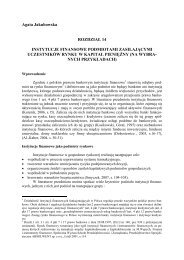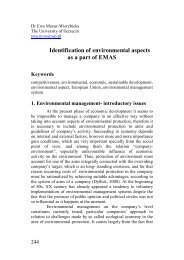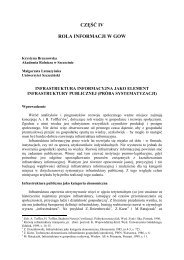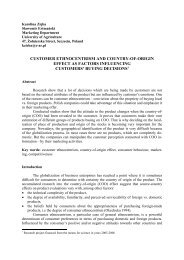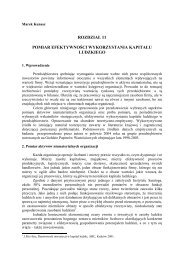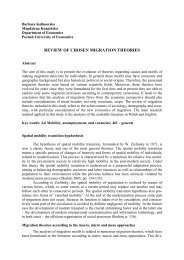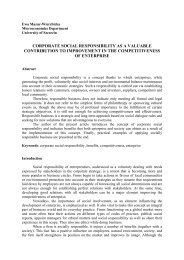Concepts of Strong Comparability and Commensurability versus ...
Concepts of Strong Comparability and Commensurability versus ...
Concepts of Strong Comparability and Commensurability versus ...
Create successful ePaper yourself
Turn your PDF publications into a flip-book with our unique Google optimized e-Paper software.
characteristics <strong>of</strong> human capital that merit attention. They are as<br />
follows:<br />
• human capital is a non-tradeable good embodied in human<br />
beings, although the flow <strong>of</strong> services generated by human capital<br />
is marketed;<br />
• individuals, particularly the young, do not always control the<br />
channel or pace by which they acquire human capital;<br />
• human capital has a qualitative as well as a quantitative aspect<br />
reflecting the quality <strong>of</strong> the educational inputs;<br />
• human capital can be either general in nature or specific to a firm<br />
or sector; <strong>and</strong><br />
• human capital generates individual <strong>and</strong> social externalities.<br />
Based on the Brundtl<strong>and</strong> definition <strong>of</strong> sustainable<br />
development, a general working definition <strong>of</strong> sustainable human<br />
capital in health would be that the health needs <strong>of</strong> the current<br />
population are being met without compromising the ability <strong>of</strong> the next<br />
generation to meet its needs. Equally, a general working definition <strong>of</strong><br />
sustainable human capital in education would be that the education<br />
needs <strong>of</strong> current population are being met without compromising the<br />
ability <strong>of</strong> the next generation to meet its needs.<br />
However, there is a major difference between natural<br />
capital, to which the sustainability concept originally applied, <strong>and</strong><br />
human capital. Natural capital is finite <strong>and</strong> non-reproducible while<br />
human capital is infinite <strong>and</strong> reproducible. From this angle, the<br />
concern about the depletion <strong>of</strong> natural resources <strong>and</strong> the degradation<br />
<strong>of</strong> eco-systems from the perspective <strong>of</strong> future generations, which is<br />
what motivated the development <strong>of</strong> the concept <strong>of</strong> sustainability,<br />
does not apply in exactly the same manner to human capital.<br />
We run down natural resources by exploiting them <strong>and</strong> use<br />
the eco-systems (air, water, l<strong>and</strong>, etc.) in the production process. We<br />
cannot accumulate natural capital (although the measured<br />
economically feasible natural resource component <strong>of</strong> natural capital<br />
can be augmented though technological change, new discoveries, <strong>and</strong><br />
higher relative prices). On the other h<strong>and</strong>, we accumulate educational<br />
human capital by educating the population <strong>and</strong> accumulate human<br />
capital in the health area through medical <strong>and</strong> public health advances<br />
that increase the overall health <strong>of</strong> the population. Of course, we can in<br />
principle run down these two types <strong>of</strong> human capital through failure to<br />
make the appropriate investments but we do not do so in the normal<br />
90



